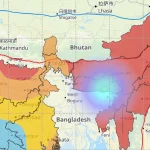According to the document titled “Country Reports on Terrorism 2021: India,” published by the United States Bureau of Counterterrorism, the government of India has made significant efforts to identify, disrupt, and degrade the operations of terrorist organisations. According to the report, “significant efforts have been made by the Indian government to identify, disrupt, and degrade the operations of terrorist organisations.”
According to the report, acts of terrorism took place in 2021 in the Union Territory of Jammu and Kashmir (J&K), the states in the northeastern region of India, and portions of the central region of India. According to another section of the report, terrorist organisations that are currently operating in India include Lashkar-e-Tayyiba, Jaish-e-Mohammed, Hizbul Mujahideen, ISIS, al-Qa’ida, Jamaat-ul-Mujahideen, and Jamaat-ul-Mujahideen Bangladesh. The year 2021 witnessed a change in the strategies employed by extremist organisations. They shifted their focus to attacks on civilians and increased their dependence on improvised explosive devices (IEDs), including an explosive attack using drones that was launched against an air force base.

In November 2021, India hosted the second Quad counterterrorism tabletop exercise along with Australia and Japan. This meeting was the 18th meeting of the Counterterrorism Joint Working Group, which was conducted jointly by the United States of America and India in October 2021. According to the report, India gives prompt responses to requests for information made by the United States in connection with investigations into terrorism and makes efforts to mitigate threats in reaction to information provided by the United States. Efforts to prevent terrorists from travelling continue to be coordinated, and warnings are being sent to authorities in the United States about potential dangers in the country and against American interests abroad.
153 terrorist attacks were recorded to have taken place in Jammu and Kashmir, India, in 2021. The assaults resulted in 274 fatalities, of which 45 were members of the security forces, 36 were civilians, and 193 were terrorists. Other noteworthy attacks included one that took place on November 1 in Manipur and involved the People’s Liberation Army of Manipur and the Naga People’s Front. This attack resulted in the deaths of seven people in an ambush, including an Indian Army officer, his wife, and his son, who was a minor. According to the report, however, there were no modifications made to India’s legislation in 2021 that was connected to terrorism.
India has increased the number of state-level Multi-Agency Centers in order to improve the information sharing that occurs between state and federal organisations. According to the official report, India put UNSCR 2396 into effect by employing watch lists, instituting biographic and biometric screening at ports of entry, and placing an emphasis on information exchange. In accordance with the terms of a bilateral agreement, the governments of the United States of America and India have agreed to work together to enhance the capabilities of information sharing and border protection.
Also read: UIDAI Introduces Artificial Intelligence-Based Fingerprint Authentication for Aadhaar
The government of the United States is waiting for the government of India to make a judgement before moving forward with an offer to collaborate on watchlisting assistance. At its airports, India is installing X-ray equipment with dual screens for the purpose of screening goods. Significant law enforcement actions taken by India include a National Intelligence Agency (NIA) Special Court sentencing three terrorists from Lashkar-e-Tayyiba/Harkat-ul-Jihad-e-Islami to prison sentences of ten years for weapons smuggling. According to the report, eight terrorists from Jamaat-ul-Mujahideen Bangladesh were convicted for attacks with explosives in Bodh Gaya in 2012.
In addition, the report states that the NIA will have investigated 37 cases connected to ISIS and will have arrested 168 individuals by September of 2021. The Financial Action Task Force (FATF), the Asia/Pacific Group on Money Laundering, and the Eurasian Group are all organisations in which India participates. The Egmont Group includes India’s Financial Intelligence Unit-India as one of its subsidiaries. According to the report from the United States, the NIA looked into nine potential instances of funding for terrorist organisations. For the purpose of preventing people in Jammu and Kashmir from becoming “radicalised,” the Indian Army operates a number of schools, training programmes, recruitment campaigns, medical camps, and emergency services.




